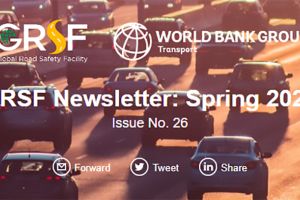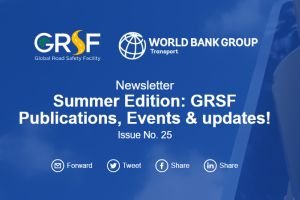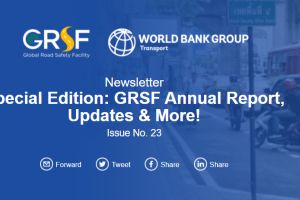Spring Edition: GRSF Publications, Updates & more!
June 13, 2022

Publication Highlights ⌵︎
Safer Sidewalks for Addis Ababa, Ethiopia
 The World Bank GRSF, with financial support from UK Aid, funded and contributed to the comprehensive study that led to the development of two valuable reports to improve sidewalk conditions in Addis Ababa, Ethiopia: the Addis Ababa Sidewalk Safety and Improvement Study summarizes the methodology, analytical findings, global best practices, and recommendations, whereas the Addis Ababa Sidewalk Design and Maintenance Guidelines provide design specifications and visual rendering for the city’s planning and transport authorities to consider as the city plans to develop its own design and maintenance standards for urban roads, sidewalks, public space, and transit-oriented development.
The World Bank GRSF, with financial support from UK Aid, funded and contributed to the comprehensive study that led to the development of two valuable reports to improve sidewalk conditions in Addis Ababa, Ethiopia: the Addis Ababa Sidewalk Safety and Improvement Study summarizes the methodology, analytical findings, global best practices, and recommendations, whereas the Addis Ababa Sidewalk Design and Maintenance Guidelines provide design specifications and visual rendering for the city’s planning and transport authorities to consider as the city plans to develop its own design and maintenance standards for urban roads, sidewalks, public space, and transit-oriented development.Policy Brief: Trauma Incidence and Emergency Medical Services in Malawi 📄
 Co-funded by GRSF, with support from UK Aid, this policy brief provides insights into the current situation and overall burden of trauma and Road Traffic Crashes (RTCs) in Malawi. It also shares how to run a digital trauma registry in a low-resource setting effectively and highlights lessons learned from the implementation of the Emergency Medical Services (EMS) pilot.
Co-funded by GRSF, with support from UK Aid, this policy brief provides insights into the current situation and overall burden of trauma and Road Traffic Crashes (RTCs) in Malawi. It also shares how to run a digital trauma registry in a low-resource setting effectively and highlights lessons learned from the implementation of the Emergency Medical Services (EMS) pilot. Detecting Urban Clues for Road Safety: Leveraging Big Data and Machine Learning
 Transport services and infrastructure are critical to the economic development of cities and regions. Funded by GRSF, with support from UK Aid, this note provides concrete guidance on how big data and Machine Learning (ML) can be leveraged in road safety analysis. The document presents opportunities to use these new technologies to improve current data collection and analysis methods for various road safety assessments.
Transport services and infrastructure are critical to the economic development of cities and regions. Funded by GRSF, with support from UK Aid, this note provides concrete guidance on how big data and Machine Learning (ML) can be leveraged in road safety analysis. The document presents opportunities to use these new technologies to improve current data collection and analysis methods for various road safety assessments.
Drink Driving - A Road Safety Manual for Decision-Makers and Practitioners
 The new Drink Driving Road Safety Manual for decision-makers was recently launched at the International Transport Forum. GRSP produced it together with the World Bank, World Health Organization (WHO) and FIA Foundation. The manual covers laws, enforcement, education, and advocacy.
The new Drink Driving Road Safety Manual for decision-makers was recently launched at the International Transport Forum. GRSP produced it together with the World Bank, World Health Organization (WHO) and FIA Foundation. The manual covers laws, enforcement, education, and advocacy.
Research Highlights ⌵︎
Availability of population-level data sources for tracking the incidence of deaths and injuries from road traffic crashes in low-income and middle-income countries
Tracking progress towards Sustainable Development Goal (SDG) 3.6 of reducing traffic deaths and serious injuries poses a measurement challenge in most low-income and middle-income countries (LMICs) due to large discrepancies between reported official statistics and estimates from global health measurement studies. This research assesses the extent to which national population censuses and health surveys can fill the information gaps.
Economic impact of 30km/h - Benefits and Costs of Speeds in an urban environment
Speed has fundamental economic costs which are hidden from many stakeholders. On the other hand, the economic benefits of speed are highly visible and strongly promoted by benefiting stakeholders and indeed carefully considered in cost-benefit assessments by road operating agencies. Thus, the main purpose of this paper is to explore and present the benefits and costs of low-speed roads in urban environments.
Comparing estimates of road traffic deaths and non-fatal road traffic injuries in Cambodia
Timely, accurate, and detailed information about traffic injuries is essential for managing national road safety programs. However, there is considerable under-reporting in official statistics of many low and middle-income countries (LMICs) and large discrepancies between estimates from the Global Burden of Disease (GBD) study and WHO’s Global Health Estimates (GHE). This article compares all sources of epidemiological information on traffic injuries in Cambodia to guide efforts to improve traffic injury statistics.
Event Highlights ⌵︎
The GRSF successfully delivered the first World Bank Road Safety Academy
 The GRSF organized the first World Bank Road Safety Academy, delivered virtually from May 23rd to 26th, 2022, under the Transport Academy learning series. This training program was delivered by the GRSF in partnership with the Global Knowledge and Regional Transport Units. Its aim was to provide the 38-participating staff across different Global Practices and regions with the knowledge and skills needed to improve the understanding of road safety development impact and opportunities in low- and middle-income countries, and to scale up road safety financing through World Bank investments. This training helped staff to better understand how to embed road safety in the design of their operations following the latest approaches in road safety, as well as raise awareness of new internal World Bank road safety mandatory requirements. You can see the World Bank Environmental and Social Framework here and the World Bank Road Safety Good Practice Note here.
The GRSF organized the first World Bank Road Safety Academy, delivered virtually from May 23rd to 26th, 2022, under the Transport Academy learning series. This training program was delivered by the GRSF in partnership with the Global Knowledge and Regional Transport Units. Its aim was to provide the 38-participating staff across different Global Practices and regions with the knowledge and skills needed to improve the understanding of road safety development impact and opportunities in low- and middle-income countries, and to scale up road safety financing through World Bank investments. This training helped staff to better understand how to embed road safety in the design of their operations following the latest approaches in road safety, as well as raise awareness of new internal World Bank road safety mandatory requirements. You can see the World Bank Environmental and Social Framework here and the World Bank Road Safety Good Practice Note here.Said Dahdah, Head of GRSF, spoke at a Regional Workshop Organized in Amman, Jordan, on Saving Lives from Road Crashes
 Said Dahdah, Head of GRSF and Global Lead for Road Safety, World Bank, recently presented at a workshop in Amman that brought together practitioners from several countries from the Mashreq (Iraq, Jordan, Lebanon, and Palestine), UN-ESCWA, international experts and the World Bank. Said highlighted the road traffic deaths as a growing crisis, noting that "more people die in road traffic crashes than HIV/AIDS, Malaria or Tuberculosis." He emphasized the importance of sharing best practices and measures to enhance road safety. Representatives from each country presented their experiences, needs, and aspirations for road safety in their regions.
Said Dahdah, Head of GRSF and Global Lead for Road Safety, World Bank, recently presented at a workshop in Amman that brought together practitioners from several countries from the Mashreq (Iraq, Jordan, Lebanon, and Palestine), UN-ESCWA, international experts and the World Bank. Said highlighted the road traffic deaths as a growing crisis, noting that "more people die in road traffic crashes than HIV/AIDS, Malaria or Tuberculosis." He emphasized the importance of sharing best practices and measures to enhance road safety. Representatives from each country presented their experiences, needs, and aspirations for road safety in their regions.
APRSO and ARSO continue to work toward Reducing Traffic Injuries
The Asia-Pacific Road Safety Observatory (APRSO) National Data Coordinators (NDCs) meeting was held on May 11th, 2022. It introduced APRSO NDCs to their roles and prepared them for their first work activity, working with the World Health Organization (WHO) on its data collection exercise for the 2023 Global Road Safety Status Report (GRSSR 2023). The African Union Commission hosted the 2nd General Assembly of the African Road Safety Observatory (ARSO). It was held virtually on March 22-23, 2022 to host a specific meeting dedicated to the National Data Coordinators (NDCs) of ARSO and encourage countries that have not yet designated their NDCs to do so.
Upcoming Event ⌵︎
🔴 REGISTER TODAY: Mobilizing Private Financing for Road Safety in LMICs
 The World Bank estimates a significant funding gap in road safety of $260 billion to achieve SDG 3.6 and 11.2 in the next ten years. This gap cannot be closed through public funding alone, and thus, mobilization of private capital is required. This launch webinar is scheduled on Tuesday, June 7th, 2022 at 9:00 am ET. It will explore the findings of the Saving Lives Through Private Investment in Road Safety report, which examines the potential for private capital mobilization to close this gap. The report investigates the market failure to appropriately account for the cost of road crashes, which prevents private capital from flowing to road safety investments.
The World Bank estimates a significant funding gap in road safety of $260 billion to achieve SDG 3.6 and 11.2 in the next ten years. This gap cannot be closed through public funding alone, and thus, mobilization of private capital is required. This launch webinar is scheduled on Tuesday, June 7th, 2022 at 9:00 am ET. It will explore the findings of the Saving Lives Through Private Investment in Road Safety report, which examines the potential for private capital mobilization to close this gap. The report investigates the market failure to appropriately account for the cost of road crashes, which prevents private capital from flowing to road safety investments.
Partnerships to Save Lives ⌵︎
Technology that gets our kids to school safely
 Globally, road traffic crashes are the number one cause of death for children between the ages of 15 to 19, and the number two cause of death among children aged 5 to 14. Sadly, around 180,000 children die annually because of road traffic crashes. A newly developed “Safe2School application” aims to reduce these preventable casualties using information crowd-sourced from all app users on their daily commute.
Globally, road traffic crashes are the number one cause of death for children between the ages of 15 to 19, and the number two cause of death among children aged 5 to 14. Sadly, around 180,000 children die annually because of road traffic crashes. A newly developed “Safe2School application” aims to reduce these preventable casualties using information crowd-sourced from all app users on their daily commute.
Developing safety plans through an updated “Road Safety Toolkit” Building on decades of road safety research, the Toolkit provides a comprehensive road safety resource to help develop safety plans for pedestrians, motorcyclists, bicyclists, cars and heavy vehicle occupants, and public transport users. The most recent update to the Toolkit was funded by Bloomberg Philanthropies under their Initiative for Global Road Safety (BIGRS 2020-2025) and was undertaken by GRSF, in partnership with the International Road Assessment Program (iRAP).
Building on decades of road safety research, the Toolkit provides a comprehensive road safety resource to help develop safety plans for pedestrians, motorcyclists, bicyclists, cars and heavy vehicle occupants, and public transport users. The most recent update to the Toolkit was funded by Bloomberg Philanthropies under their Initiative for Global Road Safety (BIGRS 2020-2025) and was undertaken by GRSF, in partnership with the International Road Assessment Program (iRAP).
Financing Road Safety in Bangladesh
The World Bank’s Board recently approved the Bangladesh Road Safety Project ($358 million USD), which will be informed and supported by GRSF under the Bloomberg Philanthropies Initiative for Global Road Safety (BIGRS). This unique project is a multi-sectoral road safety investment project in the region. The Project Development Objective is to build road safety management capacity and achieve a targeted reduction in traffic fatalities and serious injuries.
Learn more about this project here
FAQs in the GRSF Speed Management Hub!
Visit GRSF's online platform that allows the wide dissemination of frequently asked questions (FAQ) on speed management, together with a comprehensive resource library and the latest news and examples of best practices on this topic.
- 📰 What is the difference between speed management and speed enforcement and how are they integrated?
- 📰 Why is it important to consider the differences in speeds of different motorized or non-motorized road users sharing the same road space?
- 📰 What are some practical road safety engineering solutions to improve pedestrian and cyclist safety through speed management?
- 📰 What is a speed management strategy vs a speed management plan?
- 📰 What are the best technologies in using speed cameras?
- 📰 How will Intelligent Speed Assistance (ISA) benefit pedestrians, cyclists and other vulnerable road users (VRU)?

Read more! To stay up to date with GRSF's latest news and events, please subscribe to our newsletters by clicking the link below.


